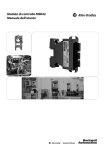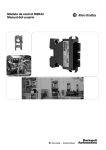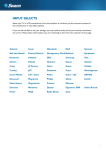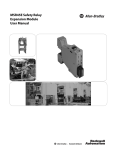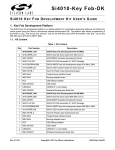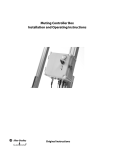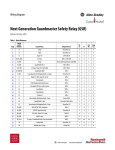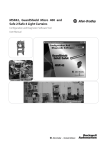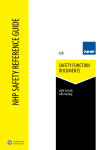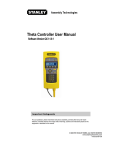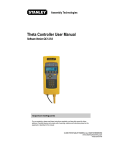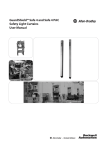Download MSR42 Control Module User Manual
Transcript
MSR42 Control Module User Manual Important User Information Because of the variety of uses for the products described in this publication, those responsible for the application and use of this control equipment must satisfy themselves that all necessary steps have been taken to assure that each application and use meets all performance and safety requirements, including any applicable laws, regulations, codes and standards. The illustrations, charts, sample programs and layout examples shown in the guide are intended solely for purposes of example. Since there are many variables and requirements associated with any particular installation, Rockwell Automation does not assume responsibility or liability (to include intellectual property liability) for actual use based upon the examples shown in this publication. Rockwell Automation publication SGI-1.1, Safety Guidelines for the Application, Installation and Maintenance of Solid-State Control (available from your local Rockwell Automation sales office), describes some important differences between solid-state equipment and electromechanical devices that should be taken into consideration when applying products such as those described in this publication. Reproduction of the contents of this copyrighted publication, in whole or part, without written permission of Rockwell Automation, is prohibited. Throughout this manual we use notes to make you aware of safety considerations: WARNING IMPORTANT ATTENTION Identifies information about practices or circumstances that can cause an explosion in a hazardous environment, which may lead to personal injury or death, property damage, or economic loss. Identifies information that is critical for successful application and understanding of the product. Identifies information about practices or circumstances that can lead to personal injury or death, property damage, or economic loss. Attentions help you identify a hazard, avoid a hazard, and recognize the consequences. SHOCK HAZARD Labels may be on or inside the equipment (for example, drive or motor) to alert people that dangerous voltage may be present. BURN HAZARD Labels may be on or inside the equipment (for example, drive or motor) to alert people that surfaces may reach dangerous temperatures. It is recommended that you save this user manual for future use. MSR42 Control Module User Manual Content Technical Data . . . . . . . . . . . . . . . . . . . . . . . . . . . . . . . . . . .12 Approvals and Conformity . . . . . . . . . . . . . . . . . . . . . . . . . 1 Appendix . . . . . . . . . . . . . . . . . . . . . . . . . . . . . . . . . . . . . . . .13 Interrupt Ignore Time . . . . . . . . . . . . . . . . . . . . . . . . . . . . . . . . . . . . . . 13 Introduction . . . . . . . . . . . . . . . . . . . . . . . . . . . . . . . . . . . . . . 1 Special features . . . . . . . . . . . . . . . . . . . . . . . . . . . . . . . . . . . . . . . . . . . . . . 2 Customer Configurations . . . . . . . . . . . . . . . . . . . . . . . . . . . . . . . . . . . . 2 Applications . . . . . . . . . . . . . . . . . . . . . . . . . . . . . . . . . . . . . . 2 Typical applications . . . . . . . . . . . . . . . . . . . . . . . . . . . . . . . . . . . . . . . . . . 2 Application restrictions . . . . . . . . . . . . . . . . . . . . . . . . . . . . . . . . . . . . . . 2 Dimensions . . . . . . . . . . . . . . . . . . . . . . . . . . . . . . . . . . . . . . . 2 EC Declaration of Conformity . . . . . . . . . . . . . . . . . . . . . .15 Approvals and Conformity The CE-declaration as well as the safety approval, performed by TÜV Rheinland GmbH are available online at www.ab.com. The actual list of relevant safety data and applied standards is given in these documents. Wiring diagrams . . . . . . . . . . . . . . . . . . . . . . . . . . . . . . . . . . 2 MSR42 units can only achieve their function as a safety control module, if the instructions in these manual and accompanying documents are followed and all laws and regulations are observed at the time of installation. Should these instructions not be carefully followed, serious injury or death may occur. The installer or system integrator has full responsibility for a safe integration of this product. This instruction manual is part of the MSR45E expander module. It must be kept accessible together with the other machine documentation during its entire life cycle for all personnel responsible for assembly, installation, operation and maintenance. Basic configuration . . . . . . . . . . . . . . . . . . . . . . . . . . . . . . . . . . . . . . . . . . 2 Customer Configurations . . . . . . . . . . . . . . . . . . . . . . . . . . . . . . . . . . . . 3 Status outputs . . . . . . . . . . . . . . . . . . . . . . . . . . . . . . . . . . . . 4 LED display elements . . . . . . . . . . . . . . . . . . . . . . . . . . . . . . 4 Response time . . . . . . . . . . . . . . . . . . . . . . . . . . . . . . . . . . . . 4 General . . . . . . . . . . . . . . . . . . . . . . . . . . . . . . . . . . . . . . . . . . . . . . . . . . . . . 4 Micro 400 safety light curtain . . . . . . . . . . . . . . . . . . . . . . . . . . . . . . . . 5 Other safety components connected to GPIO terminals . . . . . . . . 5 MSR45E relay expansion module . . . . . . . . . . . . . . . . . . . . . . . . . . . . . 5 Basic configuration . . . . . . . . . . . . . . . . . . . . . . . . . . . . . . . . . . . . . . . . . . 5 Installation . . . . . . . . . . . . . . . . . . . . . . . . . . . . . . . . . . . . . . . 5 Mounting location . . . . . . . . . . . . . . . . . . . . . . . . . . . . . . . . . . . . . . . . . . . 5 Cable and wires . . . . . . . . . . . . . . . . . . . . . . . . . . . . . . . . . . . . . . . . . . . . . 5 Supply voltage . . . . . . . . . . . . . . . . . . . . . . . . . . . . . . . . . . . . . . . . . . . . . . . 5 Earth connection . . . . . . . . . . . . . . . . . . . . . . . . . . . . . . . . . . . . . . . . . . . . 6 Micro400 light curtain . . . . . . . . . . . . . . . . . . . . . . . . . . . . . . . . . . . . . . . 6 Start mode . . . . . . . . . . . . . . . . . . . . . . . . . . . . . . . . . . . . . . . . . . . . . . . . . . 6 Minimum off time . . . . . . . . . . . . . . . . . . . . . . . . . . . . . . . . . . . . . . . . . . . 6 EDM or start release . . . . . . . . . . . . . . . . . . . . . . . . . . . . . . . . . . . . . . . . . 6 Safety Components . . . . . . . . . . . . . . . . . . . . . . . . . . . . . . . . . . . . . . . . . . 7 Safety Override . . . . . . . . . . . . . . . . . . . . . . . . . . . . . . . . . . . . . . . . . . . . . . 7 OSSD connections . . . . . . . . . . . . . . . . . . . . . . . . . . . . . . . . . . . . . . . . . . 8 Muting . . . . . . . . . . . . . . . . . . . . . . . . . . . . . . . . . . . . . . . . . . . . . . . . . . . . . 8 Blanking . . . . . . . . . . . . . . . . . . . . . . . . . . . . . . . . . . . . . . . . . . . . . . . . . . . . 8 Blanking Teach-In . . . . . . . . . . . . . . . . . . . . . . . . . . . . . . . . . . . . . . . . . . . 9 Single Scan Filter . . . . . . . . . . . . . . . . . . . . . . . . . . . . . . . . . . . . . . . . . . . . 9 Testing the MSR42 . . . . . . . . . . . . . . . . . . . . . . . . . . . . . . . . . . . . . . . . . . 9 Introduction The MSR4x is a family of extremely compact safety controller modules. The main controlling module allows for the connection and control of the compact Allen-Bradley GuardShield Micro400 safety light curtain. Depending on the configuration, other safety components can also be connected and monitored simultaneously. Diagnostic . . . . . . . . . . . . . . . . . . . . . . . . . . . . . . . . . . . . . . .10 External faults . . . . . . . . . . . . . . . . . . . . . . . . . . . . . . . . . . . . . . . . . . . . . . 10 Internal faults . . . . . . . . . . . . . . . . . . . . . . . . . . . . . . . . . . . . . . . . . . . . . . 10 Expansion modules Selection tables . . . . . . . . . . . . . . . . . . . . . . . . . . . . . . . . . .11 Main module Accessories / Components . . . . . . . . . . . . . . . . . . . . . . . .11 Inspection and service . . . . . . . . . . . . . . . . . . . . . . . . . . . .12 Inspections . . . . . . . . . . . . . . . . . . . . . . . . . . . . . . . . . . . . . . . . . . . . . . . . . 12 Decommissioning . . . . . . . . . . . . . . . . . . . . . . . . . . . . . . . . . . . . . . . . . . 12 Product labels . . . . . . . . . . . . . . . . . . . . . . . . . . . . . . . . . . .12 Figure 1: MSR42 controller with some safety components which can be connected (depending on individual configuration) Either the MSR41 or 42 offers two safety PNP outputs. Extension modules are available for applications which need relay contact outputs. Original instructions 1 Light Curtain Multi-Function Control Module User Manual Up to three expander modules can be easy attached & controlled by the base module. In addition to the multifunction controllers, models are offered in special configurations which are described in the appendix at the end of this manual. Special features The characteristics of the MSR42 base module: • Category 4, PLe according to EN ISO 13849-1 • Type 4 according to EN61496-1 / -2 • SIL CL3 according to EN62061 • SIL3 based on IEC 61508 • Short response times • Expandable • Up to 3 safety relay expander modules per base module • Adjustable stop delay time • Different safety components suitable for connection • Blanking • Muting • Single scan selectable • Automatic storage facilities Application restrictions MSR42 base modules are not intended for application in explosive (EX) or in radioactive environments. Dimensions The dimensions of the MSR42 housing are illustrated in Figure 2. Customer Configurations The configuration of a MSR42 base module may very easily be adapted to the customer requirements of an individual application with the help of the USB/optical interface and the Allen-Bradley Guardmaster Software “Configuration & Diagnostic Tool”. More information can be found in the Software Technical Manual. The software is capable of generating a configuration control document which lists configurations and specifications of the controller and light curtain (Figure 16). The resolution and the response time may increase due downloading other configuration settings for the Micro 400 and other safety sensors connected to MSR42. Consider the relevant resolution and the maximum response time when evaluating the safety distance. See Chapter 7. All relevant data of the actual configuration are always described in the actual configuration control document for that controller. Make sure that the actual document is always stored near to the control unit. Figure 2: Base module dimensions are the same for expansion modules Wiring diagrams Basic configuration The following figures show the connection possibilities for the MSR42 base module with the basic configuration. The logic of this basic version is exemplified in the accompanying configuration control document: Figure Safety component Start mode Start release Figure 3 Micro400 manual no Figure 4 Micro400 manual yes Figure 5 Micro400 automatic no Figure 6 Micro400 automatic yes Applications Typical applications Typical MSR42 base module applications are: • Presses • Robotic cells with automatic insertion • Assembly lines • Indexing tables • Conveyor systems 2 Original instructions MSR42 Control Module User Manual Figure 3: MSR42 base module (basic configuration, manual start) ). For teach-in see page 8 Figure 4: MSR42 base module (basic configuration, manual start, with start release). For teach-in see page 8 Figure 6: MSR42 base module (basic configuration, automatic start, with start release). For teach-in see page 8 Figure 7: MSR42 base module and MSR45E expander module (basic configuration, automatic start, with start release). For teach-in see page 8 Customer Configurations The configuration of a MSR42 control module is set up via of the USB/ optical interface and the Allen-Bradley GuardShield Software “Configuration & Diagnostic Tool”. The configuration procedure can be found in the Technical Description Manual. Configuration details can be found in the specific configuration control document for the MSR42. Figure 5: MSR42 base module (basic configuration, automatic start). For teach-in see page 8 The following features may be selected: • Stop delay • Single scan for faster response times • Configuring GPIO terminals for one or two safety inputs • Configuring GPIO terminals for E-Stop or door switch • Safety Override • Muting • Blanking A new configuration has to be downloaded to the MSR42 controller by authorized personnel using the USB/optical interface (445L-AF6150). Original instructions 3 Light Curtain Multi-Function Control Module User Manual LED If authorized personnel reconfigure the control module using the USB/optical interface, then depending on the configuration the response time or the stop delay time t(delay) may increase. So it is very important that after every new configuration. a. the configuration change label (page 13) is placed on the control module and b. the new response time is confirmed to be within the limits given by the risk analysis of the machine and c. All relevant data of the actual configuration are always described in the actual configuration control document for that controller. Make sure that the actual document is always stored near to the control unit. d. Using the blanking mode, the resolution of the Micro 400 will be reduced. Label the Micro 400 with the new resolution. A label is supplied with the Micro 400 light curtain mounting kit. Signal / Color /Status Signal / Color /Status Lamp Orange / muting or blanking Off / muting or blanking not activated activated GPIO4 +24 V / green / automatic start GPIO3 +24 V / green / manual start 0 V / off / manual start signal high or automatic start GPIO2 +24 V / green / Teach-in Blanking active 0 V / off / Teach-in Blanking inactive GPIO1 +24 V / green / Teach-in Blanking active 0 V / off / Teach-in Blanking inactive OSSD2 +24 V / green / Micro 400 not 0 V / red / Micro 400 activated Activated (e.g. interrupted) OSSD1 +24 V / green / Micro 400 not 0 V / red / Micro 400 activated Activated (e.g. interrupted) Info2 (LED) See page 4 See page 4 Info1 (LED) See page 4 See page 4 IN2 +24 V / green / start release 0 V / red / no start release okay signal IN 1 +24 V / green / no test 0 V / red / test 0V - - +24 V +24 V / green / power connected 0 V / off / no power connected 0 V / off / manual start Table 2 Status outputs The MSR42 base module has two status outputs (“Info1” and “Info2”). The logic of these two outputs depends on the configuration. A description of these outputs is given in the configuration control document. The following table shows the logic of the two status outputs for the basic configuration. The state of the status outputs will also be displayed through LED, visible on the front side of the main module. Terminal (LED) Output "high" (+24 V) Output "low" (0 V) Info1 (LED) Start ok (green) No start possible (red) Info2 (LED) System okay (green) Error (Lock out) (red) Table 1 These outputs may not perform any safety relevant functions. They are diagnostic outputs which provide status to a machine controller. Response time General The response time of a MSR42 main module depends on the configuration. The relevant maximum response times for the MSR42 control module, with respect to a specific Micro 400 light curtain and MSR45E expander module, as well as a specific safety component may be calculated using the formulas below. The response time may be increased if a stop delay time t(delay) is configured for a safety component or a Micro 400 light curtain. During this delay, all start impulses are ignored. The safety outputs will switch off at the end of this delay period. The controller is shipped with the double scan filter. Single scan filter can be selected to reduce the response time. The relevant times may be found in the corresponding configuration control document (e.g. see configuration software manual). LED display elements Terminology Table 2 gives information about the LED on the front side of a MSR42 control unit with the basic configuration: t(C) 4 Response time for the MSR42 control module (evaluation time), without light curtain evaluation time t(LC) Response time of the light curtain t(delay) Stop delay time for the outputs t(em) Response time for the MSR45E expansion module t(GPIO) Evaluation time for the safety component (GPIO filter time) t(SCext) Response time of the external safety component (e.g. Safe4) t(totLCOSSD) Maximum OSSD response time triggered by the light curtain t(totLCEXT) Maximum relay extension module response time for the light curtain t(totSCOSSD) Maximum OSSD response time for the safety components on GPIO Original instructions MSR42 Control Module User Manual Basic configuration Terminology t(totSCEXT) Maximum relay extension module response time for the safety components on GPIO Table 3 The response time of the device under a specific configuration can be found in the configuration control document (see configuration software manual) The maximum controller response time t(C) for the MSR42 control module is given in chapter 14 However, depending from the connected Micro 400 light curtain, the response time may be faster. The exact value can be read out from the configuration control document, created with the Configuration & Diagnostic Tool software. If authorized personnel reconfigure the controller using the USB/optical Interface (445L-AF6150), then depending on the configuration the response times may be increased. So it is very important that after every new configuration to proceed according chapter “Customer Configurations” on page 3. Micro 400 safety light curtain The light curtain response time t(LC) is a part of the response time for the OSSD outputs. The label of the Micro 400 shows the worst case response time which occurs when the MSR42 runs active double scan filter (default). Using a single scan yields a faster response time but this makes the light curtain more vulnerable to ambient light. The light curtain response time t(LC) with the double scan filter can be found in the Micro 400 manual and with/without double scan filter in the configuration control document (see configuration software manual). The configuration control document gets generated by the MSR42 Software “Configuration & Diagnostic Tool”. Therefore the light curtain resolution and protective field height has to be entered. Installation t(totLCOSSD) = t(C) + t(LC) + t(delay) For proper installation and connection, please consult the relevant laws and regulations. The safety officer of the manufacturing facilities, the local authorities (OSHA in USA, HSE in GB) or the respective industry associations are available for any safety related queries. The requirements of the safety regulations of electrical engineering, the local employer’s liability insurance association and the international standard IEC 60204 are to be taken into full consideration. In the following chapters the installation of all possible safety components, which can in general be connected to a MSR42 control module, is also described. Which safety component has to be connected to guarantee a faultless function is printed in the corresponding configuration control document for the MSR42 control module. Output relay extension module Mounting location The response time for the MSR45E expansion module (relay safety output) with respect to the Micro 400 light curtain is the sum of the OSSD response time and the response time of the extension module. The MSR42 control modules must be mounted in a control cabinet which is sealed to at least IP54. The units must be snapped onto a 35 mm mounting rail, which is grounded. If it is used outside of a control cabinet housing with a protection category of IP54 and a mounting rail capability is recommend. The response time for the MSR42 main module (OSSD safety outputs) with respect to the Micro 400 light curtain t(totLCOSSD) is the sum of the controller response time t(C) + the response time of the light curtain t(LC) + ,the stop delay time t(delay) (if a delay is configured and selected for the Micro 400). Output OSSD t(totLCEXT) = t(totLCOSSD) + t(em) Other safety components connected to GPIO terminals Cable and wires The response time of the MSR42 control module OSSD safety outputs with respect to the safety components connected to the GPIO terminals is the sum of the controller response time and the response time of the Micro 400 light curtain, the safety component evaluation time, the response time of the external connected safety components and the stop delay time (if delay is configured and selected for the safety components). The wires from the MSR42 control module must be securely separated and guided away from the wires of the relay section (MSR45E expander module). In the case of high EMC levels shielded cables may be required to preserve signal integrity. t(totSCOSSD) = t(C) + t(LC) + t(GPIO) + t(SCext) + t(delay) To safeguard the controller, the +24 V terminal should be protected with an external 5 A fuse. The controller and the machine should be off-line before beginning the installation. The supply voltage must conform to the requirements of EN 60204-1, it must bridge a 20 ms interruption of the supply network. When considering the supply voltage, it must be one of the following: SELV (Safety-Extra-Low-Voltage) or PELV (ProtectiveExtra-Low-Voltage) in accordance with IEC 364-4-41. MSR45E relay expansion module The response time for the MSR45E extension module (safety relay output) with respect to the safety components connected on the GPIO terminals t(totSCEXT) is the sum of the main module response time t(totSCOSSD) + and the response time of the extension module t(em). Supply voltage t(totSCEXT) = t(totSCOSSD) + t(em) Original instructions 5 Light Curtain Multi-Function Control Module User Manual Earth connection According to EN 60204 article 9.2.4.4.2 a system may not automatically restart, even after the cause of the shutdown has been eliminated and thereby another danger may still exist to the operator. If the MSR42 control module is configured with an “automatic start”, this requirement must be fulfilled by further measures. The earth of each MSR42 control module is realized through the connection to the mounting rail. Consequently it is important to ensure, that the mounting rail has a good earth connection. Micro400 light curtain The two RJ45 sockets on the lower portion of the control module are for the connection of Allen-Bradley GuardShield Micro400 (white = E = emitter; blue = R = receiver). To help protect the RJ45 connectors the cables have to be snapped into the provided cable holders at the.MSR42 housing. Start mode The MSR42 can be configured to have the following start modes: • automatic start or • manual start. In case of the basic configuration the start mode can also be configured without the configuration software. By connecting +24V to GPI03 and GPI04, automatic reset is enabled (see wiring diagrams). Manual start When all of the inputs of the safety system have a safe signal, depressing the start button will cause the two safety OSSD outputs to change from low to high. If a MSR45E relay expander module is connected, it will close. If more than one safety component is configured, then all components must have safe signals to all inputs before a start is allowed. The start button is monitored to prevent an unintentional start. Pulse length must be between: 50 ms and 5 sec. If the start impulse is longer or shorter, the start input will be ignored by the device. The configuration control document identifies which terminal the start button is connected to. If the start button is connected to IN1or IN2 then a red LED indicates that a start signal is present, a green LED indicates no signal is present. Terminal LED green LED red IN 1 or IN 2 No start signal present Start signal present (button pressed) Table 4 It is fundamental that the start button be mounted so that the danger area is clearly visible. That is, when pressing the start button it must be guaranteed that no one is detained within the danger area. Minimum off time According to the standard IEC 61496-2 a safety light curtain must have a minimum safety output off time of 80 ms. This means that even in the case of a very short safety light curtain interruption, the safety outputs will stay low (Relays = open) for 80ms at minimum. A start signal will only be recognized after the 80ms duration. EDM or start release If an MSR42 is used with external relays or contactors, the contacts of that device must be monitored. An example category 4 application has two external contactors, each with force guided contacts must be inserted. For monitoring the function of these contactors, each relay block must have at least one normally closed contact which is fed back in series to IN2 (or IN1 depending on configuration) of the MSR42 control module (e.g. Figure 4). Two options are possible for this monitoring: 1. Start release: The signal at the corresponding input terminal must be high before the start button is pressed (this means: the normally closed contacts of the external relays must be closed before allowing a start). The option “start release” is pre-configured in the MSR42 control module (440R-P226AGS-NNR) (e.g. Figure 4). 2. EDM (external device monitoring): The input signal of the EDM terminal is always monitored. This means: not only at the beginning before a start the signal must be correct. Also after the start a signal change must happen, otherwise an emergency stop occurs. If a high signal is present for longer than 5 seconds, a lock-out will occur. If the configuration control document shows that EDM or start release must be attached to terminal IN 1 or IN 2, then the meaning of the respective LED is shown below. Terminal LED green LED red EDM at IN 1 or IN 2 EDM signal okay EDM signal wrong Start release at IN 1 or IN 2 Start release signal okay Start release signal wrong Warning: Important safety advice: Table 5 Automatic start The start release or EDM input is not cross-fault monitored and therefore not a safety input. If a safety component is configured for “automatic start”, then, after the activation and the deactivation of the safety component, the two OSSD outputs will change automatically from low to high again and if connected the MSR45E expander relay contacts will automatically reclose. 6 Original instructions MSR42 Control Module User Manual 1. In cases where the MSR42 control module is installed without expander modules the function external device monitoring (EDM) or start release must always be used, the only exceptions are if the PNP outputs are connected with another safety relay or a safety PLC. 2. Through the use of start release or EDM, it is possible to switch external “power” contactors within the safety circuit. Such contactors often deal with large inductive loads, which during the switching off phase can create large potential peaks. For this reason surge suppressors are highly recommended. Surge suppressors must be connected parallel to the external contactors (e.g. Figure 4). They may never be connected parallel to the contacts of a MSR45E expander module. Surge suppressors may drastically increase the off delay time of the contactors. Diodes are not allowed to be used as surge suppressors, for exactly this reason. Figure 8: Connecting an emergency stop In general the two circuits of dual channel safety components are crossfault monitored. A short of these two circuits would lead to an emergency stop of the MSR42 control module. The two circuits are also time monitored. This means, if one circuit changes e.g. of an emergency stop, the second circuit has to follow within 5 seconds. If this is not the case, the MSR42 interprets this as a fault and the controller switches off the safety circuit. Depending on the configuration and the application, there may be more terminals than components needed. The unused ports may be bridged. Shielded cables are recommended for bridging to reduce the input of EMC. Terminal LED green LED off GPIO3 Contact GPIO1/GPIO3 closed Contact GPIO1/GPIO3 open GPIO4 Contact GPIO2/GPIO4 closed Contact GPIO2/GPIO4 open Recommended surge suppressors are: Table 7 Supply voltage [V] Resistor R [Ω] Condenser C [μF] 24 100 2.2 115 - 230 220 0.2 Table 6 Safety Components The connected safety components (e.g. safety switches, position switch, emergency stop buttons, cable pull safety switches) must satisfy the relevant standards for application within safety areas: • Emergency stop button : EN 418 • Safety switch : EN 60947-5-1 • Light curtains : EN 61496-1 / -2 • etc. as well as the requirements of the safety analysis. It is essential that the components contain 2 force guided, normally closed (NC) contacts (Figure 8), and that they are approved for the relevant safety level or category. As a basic rule to increase reliability, it is recommended to use safety components with integrated gold contacts. Safety components, can be connected to “GPIO1” through “GPIO4” as shown below. The inputs are short-circuit and cross fault monitored. Safety Override In Figure 9 a “Safety Override” key switch and a safety prevention lamp is shown. With the “Safety Override” key switch it is possible to override the safety function of the Micro400 light curtain. This means that if the override key switch is activated, the safety outputs stay high even if e.g. the protective field is interrupted. Figure 9: Connecting a Safety Override key switch and the associated lamp Depending on the risk evaluation when using a “Safety override” key operated switch a corresponding indicator lamp must also be connected. The connection for this safety override lamp can be configured to be current controlled (see Technical Data chapter 14). This means, the current (I) of the individual lamp must remain between (Imin < I < Imax). If the monitored current is not within these limits, the light curtain will not be overridden although the safety override key switch is activated. The safety override lamp used has to fulfil the requirements of EN 61496 and has to be mounted close to the protective field and be clearly visible to the machine operator. Safety override only takes place when both circuits are closed. Likewise safety override only takes place when both circuits were opened before becoming closed. A cross-fault will be Original instructions 7 Light Curtain Multi-Function Control Module User Manual detected and stop the Safety override function from becoming activated. After one of the circuits is opened, the amount of time until the safety function of a safety component is active again is maximum the response time of the MSR42 module. If an application does not require a safety override lamp (only allowed after a safety evaluation corresponding to EN 12100), the monitoring of the lamp can be deactivated in the configuration. Note that the lamp still will indicate the override function, but is no longer monitored. Instead of a safety prevention key switch, an enabling switch or two independent, safety position sensors may be used, depending on the application and the risk assessment. Terminal LED green No LED flashing GPIO3 Contact GPIO1/GPIO3 closed Contact GPIO1/GPIO3 open GPIO4 Contact GPIO2/GPIO4 closed Contact GPIO2/GPIO4 open Table 8 Terminal LED off LED orange Lamp Safety override circuits opened Safety override circuits closed Table 9 1. The use of the “Safety override” function is only allowed in applications, for which the risk analysis (EN ISO 12100-1 and EN14121) permits for the override of a safety component. As a general rule, emergency stop buttons may never be overridden! The safety override key for this switch has to be stored securely, so that only authorized personnel have access to this key. 2. The function “Safety override” can not be understood as the function “Muting” which is specified as the temporary automatic suspension of a safety function in the standard IEC 61496-1 A.7 or IEC 62046! Additional requirements have to be fulfilled to realize the “Muting” function which are not described here. OSSD connections Overall response time of a system is the sum of the response time of the OSSD outputs of the connected safety component (e.g. light curtains or laser scanners) and the response time of the MSR42 and if used the MSR45E modules (see Configuration Control Document). Figure 10: Connection of up to two OSSD safety components (e.g. GuardShield Safe4 light curtain systems) 8 SensaGuard safety switch OSSD outputs cannot be connected to the GPIO1GPIO4. Muting Muting is the temporary automatic suspension of a safety function. Using the USB/optical interface and the “Configuration & Diagnostic Software” different types of muting can be configured. There are several muting option settings for light curtain systems. Details about different types of muting and their characteristics can be found in the software MSR42 Software “Configuration & Diagnostic Tool” and the configured muting parameters are listed in the corresponding configuration control document. Blanking Blanking is typically used to allow a material to pass through the light curtain during normal operation without causing a fault or stop condition. This can include a sheet of metal passing through the light curtain before an operation is performed to form the material. The Light curtain will permit the material at a specific thickness but nothing more without causing the safety outputs to turn off. The MSR42 already supports teach-in fixed blanking via the basic configuration. There are two types of blanking available through the MSR42: • Fixed blanking • Floating blanking When blanking is activated this has to be clearly indicated by a display or a lamp. The MSR42 has only one monitored output available for muting or blanking lamps. Therefore, muting and blanking cannot be configured simultaneously. After configuring one of the Blanking functions, the light curtain resolution may be changed. Therefore it is necessary to attach an updated label to the Light Curtain noting the changed resolution has changed. On cascaded light curtains check especially for the beams in the area of the end of the protective fields. In case of faulty settings the blanking range may be unintentionally on the wrong stick. Fixed blanking with monitoring requires the material to be present at all times to prevent a fault condition. In many applications, the material may shift slightly during normal operation. This can cause up to one more beam to be blocked. Since this can occur during normal operation, the MSR42 is configured to permit one additional beam to be blocked without causing a fault (beam tolerance: -1 beam). As a result of adding one more beam to the configured blanked area, it increases the resolution of the light curtain. The table below shows the new resolution. standard Blanking area Finger resolution 14mm 24mm Hand resolution 30mm 55mm Table 10 Original instructions MSR42 Control Module User Manual Adjoining of two blanking areas with fixed blanking or floating blanking with monitoring the resolution in this area rises up for 2 beams. standard adjoining blanking area standard Blanking area Finger resolution 14mm 34mm Hand resolution 30mm 80mm • • Table 11 • Blanking can be activated with • downloading a customer configuration or • using the teach-in blanking function. • For configuring blanking and obtaining additional information surrounding the subject see the description of the software “Configuration & Diagnostic Tool”. • Blanking Teach-In Blanking Teach-in is a function, which allows the ability to set one or two fixed blanking area(s) without the use of the configuration tool or configuration software. The customer has to connect a key switch to a pair of GPIO-inputs according Figure 11. The key switch must have two channels to select this mode. Only an authorized person may have the key to do a teach-in. If the configuration allows for a teach-in of fixed blanking the following process takes place: The blanked object(s) has to be in the light curtain during the whole teachin process. The authorized person has to set the key switch. After that the teach-in process starts. The teach-in function is shown when the connected lamp is blinking. If the teach-in function is finished and stored in the MSR42 the lamp will be on, otherwise the lamp will be off and the configuration is unchanged. If the teach-in blanking function is successfully finished the authorized person has to reset the key switch so the contacts are open, no longer connected to 24VDC. Single Scan Filter By default the MSR42 is operating in a double scan mode. This mode is very robust against electrical or optical disturbances. The controller scans the light curtain optical elements two times to evaluate the state of the light curtain. The single Scan Filter can be activated by deselecting the double scan mode in the Micro 400 window of the MSR42 “Configuration & Diagnostic Tool” software, (see “Double Scan Filter” in Software Configuration Tool Manual) Figure 11: Key switch with two channels for activating When the two channels are closed, the teach-in blanking mode is active and the lamp is blinking. The safety outputs turn off and the beams interrupted will be stored as the fixed blanking areas. It is recommended to teach the MSR42 blanking areas in the application to ensure the proper beams are blanked. Up to two different fixed blanking zones can be configured via the external “teach-in” selector switch. Double scan mode causes a longer response time than single scan mode. Consider the relevant maximum response time when evaluating the safety distance. Testing the MSR42 The MSR42 control module complies with safety Category 4, PLe Per EN ISO 13849-1. The execution of the security function must be tested at regular intervals via higher level controllers. The frequency of this check is based on the results of threat and risk analysis of the machine (EN ISO 12100-1 and EN14121). Furthermore the MSR42 control module is certified according to SIL3 of IEC 61508. Normally the test input at the main module is connected to +24 V. If an external test is desired according to the risk analysis, a contact can be connected to IN 1. In case of operation in a “self test mode” both OSSD outputs have to be connected separately to the safety circuit of the machine. Original instructions 9 Light Curtain Multi-Function Control Module User Manual Following connections may be used for test inputs. More detailed lock out information can be obtained with help of the USB/optical interface (445L-AF6150) and the software “Configuration & Diagnostic Tool”. External faults Figure 12: Connection possibilities for the input The following external faults apply to the “Out of Box” configurations only. Reference Table 14 for detailed information. The timing of test input is as follows (Figure 13): No Time Value in ms Response time to test signal t1 ≤ tR ime to test t2 ≤ t1 Restart time after test t3 ≥ tR 1 2 Fault profile Fault description Measures & instructions No power LED No Power Connection to +24 VDC OV Check power connections and power supply Light curtain Rx / Tx are swapped Reverse Rx / Tx connections and retry Open / missing light curtain cable Replace expansion cable on the light curtain that is not flashing Defect in light curtain Replace light curtain Light curtain LED(s) are flashing red Table 12: Timing during testing Missing reset switch for manual Add rest switch with N/O contact reset short circuited open Test input 3 OSSD 1 / OSSD 2 t1 t2 OSSD1 & OSSD2 LEDs are red No relay outputs t3 Missing 24 VDC to GPIO3 and GPIO4 for automate reset. Add 24VDC jumper to GPIO3 and GPIO4 Missing 24VDC to IN1 and IN2 Add 24VDC jumper to IN1 and IN2 No start release signal from external contactors Check wiring and function of external contacts Table 14 Figure 13: Test timing diagram (minimum off time = see configuration control document) tR means the max response time of the total system (see page 4). The machine controller has to check the output of the OSSD during such a test. If the machine controller detects an error, then the machine controller should not allow the machine to restart, respectively must stop the machine immediately. In case of a test failure the status output “Info2” will also provide a failure signal. Terminal IN 1 or IN 2 LED green External test signal high LED red External test signal low (test running) Programmed Configuration Diagnostics can be obtained with the use of USB / Optical Interface (445l-AF6150) and the software “Configuration and Diagnostic Tool” Internal faults The following internal faults apply to the “Out of Box” configurations only. Reference Table 15 for detailed information. No Fault profile Fault description Measures & instructions 1 No Power LED Power supply is ok but MSR42 relay does not power up Replace the MSR42 and retry 2 Relay is in Lockout mode Will not initialize All input and reset LEDS are ok. No external faults were detected. Relay locks upon power up and will not release Replace the MSR42 and retry Table 13 Diagnostic Table 15 In the event of a fault condition, it will be indicated by 1. the red LED of a connected GuardShield Micro 400 safety light curtain are blinking 2. can be visually noticed in that the blue OptiLink LED (located on the side of a MSR42 unit) is off 3. one of the info outputs (if configured) In this situation both safety outputs are low and the relays of the extension modules are open, and the controller unit is now in the socalled lock-out mode. Two options exist to leave the lock-out mode: • Power up. If the fault is still present the controller will again show the lock-out mode. • A start impulse longer than 10 s acts like a power up. 10 The lock-out mode of a MSR42 control module may be reset by one of two methods: 1. Power down, then Power up. If the fault is still present the module will again lock-out. 2. A start signal longer than 10 seconds acts like a power up. Further diagnosis possibilities are possible with the software Configuration & Diagnostic Tool in combination with the USB/optical interface. If the MSR42 unit has a lock-out, the exact fault description can be determined with these tools. An exact description is available at any time after a lock-out, as long as the MSR42 unit is still in the lock-out condition. Original instructions Light Curtain Multi-Function Control Module User Manual Selection tables Mounting Size Cat. No. 35 mm DIN Rail 22.5 mm 440R-P221AGS 35 mm DIN Rail 22.5 mm 440R-P226AGS-NNR MSR41 ON/OFF MSR42 Multi-functional module Optional Safety Relay Interfaces Relay Input Voltage Reset Outputs Cat. No. 2 N.O. 440-P4NANS MSR45E Safety Relay Expansion Module Supplied by MSR41 Determined by or MSR42 MSR41 or MSR42 Table 16 Accessories / Components Part number Description 440R-ACABL1 Ribbon Cable – Two modules 440R-ACABL2 Ribbon Cable – Three modules 440R-ACABL3 Ribbon Cable – Four modules 440R-ATERM1P Terminal Block Kit - MSR41 440R-ATERM2P Terminal Block Kit - MSR42 440R-ATERM2C Terminal Block Kit - MSR45E 445L-AF6150 USB USB/optical Interface www.ab.com Software Configuration Tool Table 17 Original instructions 11 Light Curtain Multi-Function Control Module User Manual Inspection and service The MSR42 control modules are built electronically and do not need preventive maintenance. Inspections The MSR42 control modules have to be tested periodically – in accordance with valid regulations - by qualified and trained personnel to discover prohibited manipulations or unauthorized modifications. Decommissioning Figure 15: The new special configuration identification "Configuration changed" must be positioned next to the existing label. Technical Data The MSR42 modules can only be removed, when the machine or the equipment is shut down completely and can no longer be operated without tools. If a controller has to be disposed, it can be simply dismantled. The separated materials can be recycled according to state of the art technology and corresponding regulations of the country it was used in. Product labels All the necessary safety information can be found on the product labels and the Configuration Control Label, which can be found on each controller module (example): Figure 14: Product label MSR42 control module General data Nominal working mode Continuous process Temperature range Environment temp.: 0 ... +55°C Stock temp.: -25 ... +70°C Enclosure rating according EN 60529 Housing Terminals Conductor connection: 4-, 5-pin, terminal strip (plug-in) IP20 IP20 Wire cross section: 1 x max 2.5 mm2 (14 AWG) stranded spring clamping technology Quick mounting Top hat rail 35 mm (EN 50022) Net weight 130 g (0.287 lbs) Housing dimensions 111 x 22,5 x 125 mm (incl. plugs) See page 2 Housing material Polyamide Vibration according to EN60068-2-6 Amplitude: 0.35 mm Frequency: 10 … 55 Hz Shock resistant according to EN 60068-2-29 Acceleration: 100 ms-2 Impulse length: 16 ms Number of shocks: 1'000 per direction Mounting 35 mm DIN Rail Approvals TÜV, CE, cULus Interfaces Optical (OptiLink) Explanation of terminology HW Hardware Version Safety Level Cat. Safety category according to EN ISO 13849-1 Safety Level SIL Safety integrity level according to EN 61508 Safety Level PL Performance level acc. to EN ISO 13849-1 Weight and packaging Dispatch packaging 280 mm x 200 mm x 70 mm Dispatch weight Net weight + 220 g Power class Power supply Temperature range Operating temperature range Power Supply OSSD Max. current available per OSSD output, at the listed voltage Input Power Entry +24 VDC (EN 60204-1) See page 4 Max. power consumption at max. supply voltage 2.1 W (semiconductor outputs unloaded) Table 18 All of the configuration information will also be found on the configuration control document, which is included with the delivery of each MSR42 control module. Note: In the event that a MSR42 control module is reconfigured by authorized personnel using the USB/optical interface, a new Configuration Control Label must be filled out and applied next to the existing label (Figure 15). Details of the new configuration are given in the configuration control document. 12 at 5 % residual ripple 0.85 ... 1.15 UN Current consumption Current max. 70 mA + 70 mA per relay extension module (semi conductor outputs unloaded) maximal: 1.7 A depending on attached load Controller protection (external) 5 A slow Inputs Safety inputs (software configurable) (1 x 2 NC or 2x 2 OSSD) and 1 Micro 400 Reset mode Automatic / Manual or Manual monitored Control current into: IN 1, IN 2 2 mA each (min.) (in accordance with EN 61131-2) Minimum voltage at: IN 1, IN 2 11 VDC at activated controller (EN 61131-2) Original instructions MSR42 Control Module User Manual Appendix Inputs Start pulse duration Min. Max. 50 ms 5s See page 7 Test pulse duration (min.) response time x 2 Control current into: GPIO1 – GPIO4 Interrupt Ignore Time 7 mA each at UN (coded) This function is not included in the standard version. Maximum cable length for safety switches 50 m out and back (total 100 m) See page 6 or 10 Safety Prevention Lamp Minimum current at Lamp 0.9 A with lamp switched on A limited time a light curtain interruption will be ignored. This may be used when parts move through the light curtain at high speed and the safety output should not switch, but yet a person moving through the light curtain should be detected and cause the safety output to switch off. Special MSR42 control module features -- for existing customers. GPIO1 – GPIO4 Outputs to safety components Nominal voltage UN – 2 V (coded) (Short circuit protected) Current max 100 mA (short-circuit protected) Leakage current IMAX Off = 0.05 mA (CLOAD = 100 μF) Activating this operating mode, a limited time a light curtain interruption will be ignored. This may be used when parts may move at a fast speed through the light curtain without interrupting, but a human will interrupt the light curtain at time longer than the configurated time. Interrupt Ignore Time will increase the response time. The response time is given in the corresponding configuration control document. Recalculate the safety distance. Info 1, Info 2 Status Outputs (PNP) Voltage UN – 2 V Current max 100 mA (short-circuit protected) Leakage current IMAX Off = 0.05 mA (CLOAD = 4.7 μF) 2 OSSD semi conductor outputs (PNP) Voltage UN - 2 V Current Max 400 mA short-circuit protected and with cross-fault detection Leakage current IMAX Off = 0.1 mA (CLOAD = 3.3 μF) Max. response time t(C) with UN protective mode See page 4 ≤ 15 ms Max. response time t(GPIO) with UN protective mode See page 4 ≤ 130 ms Minimal off time 82 ms The Interrupt Ignore Time function has to be activated by the MSR42 “Configuration & Diagnostic Tool” software and downloaded to the MSR42 control module with help of the USB/optical interface (445LAF6150) Safety Related Parameter 6.0 E-9 1/h MSR42 & MSR45E & Micro 400 Probability of a dangerous failure per hour PFHD 9.0 E-10 1/h MSR42 & MSR41 Control Module 3.0 E-10 1/h MSR45E Expander Module 4.0 E-9 1/h Micro 400 Light Curtain Performance Level PL PL e, Cat. 4 (EN ISO 13849-1) Safety Integrity Level SIL CL 3 (IEC 61508 / IEC 62061) Original instructions 13 Light Curtain Multi-Function Control Module User Manual Configuration control document Configuration designation AB B001 (AB B001.cfg) Rockwell Automation The MSR42 safety control units may only be configured by authorized people. This sheet shows the actual system parameters of the configurator and has to be stored together with the manual. The device number has to correspond to the number on the control document. Old control documents have to be exchanged! To receive more information see manual or contact your local ROCKWELL AUTOMATION Partner. User registration: Company: First Name: Name: Address: Zip code: Rockwell Automation John Doe Street 2 12345 City: Country: Phone: Fax: Email: Town US +1 123 456 7890 +1 123 456 7890 jdoe@ e-mail .com Current set up Installed hardware: MSR42 Attached GuardShield Micro 400 Order Code not specified GuardShield Micro 400: Number of beams: not specified GuardShield Micro 400: Response time t(LC): see label light curtain GuardShield Micro 400: Evaluation time t(EvalLC): see label light curtain (only important for interrupt ignore time) Controller response time t(C): 14.70 ms Stop delay time t(delay): 0.00 ms Interrupt ignore time t(ignore): 0.00 ms Response time for safety component on GPIO t(GPIO): 0.00 ms Response time for extension modul t(em): 6.00 ms Maximum OSSD response time for GuardShield Micro 400 light curtain: t(totLCOSSD)=t(C)+t(LC)+t(delay): 14.70 ms + t(LC) (see label) Maximum relay extension module response time for GuardShield Micro 400 light curtain: t(totLCEXT)=t(C)+t(LC)+t(delay)+t(em): 20.70 ms + t(LC) (see label) Configuration Filename (Configuration file): Configuration designation Device No. AB B001.cfg AB B001 000000 Connector / Pin Function Remarks RJ45 Safety light curtain Start Mode: manual / Stop Delay: No / Double scan2 GPIO1/2 TeachIn Blanking GPIO3 Start button GPIO4 Start mode IN1 Test input IN2 Start release OSSD (ChA) and relay outputs (ChB) Info1 Status Output EDM or start release/GuardShield Micro 400 light curtain Info2 Status Output Lockout Safety Outputs Contact monitoring Start release Depends on GPIO4: 24V = auto, 0V = manual Additional safety information (ChA: OSSD outputs, ChB: Relay outputs) Safety category (EN ISO 13849): SIL level (EN/IEC 61508): EDM response time: Minimal off time: PLe, Cat. 4 3 300 ms 82 ms 14.03.2011 / Signature: ______________________________________ Configuration printout (1.0.2.61) 14.03.2011 15:30:15 Page 1 of 1 Figure 16: Configuration Control Document for the MSR42 controller with basic configuration 14 Original instructions Light Curtain Multi-Function Control Module User Manual EC Declaration of Conformity The undersigned, representing the manufacturer Rockwell Automation, Inc. 2 Executive Dr. Chelmsford, MA 01824 USA Herewith declare that the Products: Product identification (brand and catalogue number/part number): Product Safety Function and the authorised representative established within the Community Rockwell Automation BV Rivium 1e Straat, 23 2909 LE Capelle aan den IJssel Netherlands MSR4x Safety Base / MSR4xE Expander Controller Modules Allen-Bradley 440R-P and 445L-1 Series (reference the attached list of catalogue numbers) The MSR4x safety base control devices and the MSR4xE extension modules can be used in applications up to Safety Category 4 (EN 954-1)/ SIL3/SIL CL3 (EN 61508 / EN 62061) and PL e (EN ISO 13849-1). are in conformity with the essential requirements of the following EC Directive(s) when installed in accordance with the installation instructions contained in the product documentation: 2006/42/EC Machinery Directive EMC Directive 2004/108/EC and that the standards and/or technical specifications referenced below have been applied: EN 61496-1:2004 + A1:2008 Safety of machinery – Electro-sensitive protective equipment – Part 1: General requirements and tests IEC 61496-2:2006 Safety of machinery – Electro-sensitive protective equipment – Part 2: Particular requirements for equipment using active opto-electronic protective devices (AOPD’s) EN ISO 13849-1:2008 Safety of machinery – Safety-related parts of control systems – Part 1: General principles for design EN 61508 Parts 1-7:1998-2000 Functional safety of electrical/electronic/programmable electronic safetyrelated systems EN 954-1:1997 Safety of machinery – Safety related parts of control systems – Part 1: General principles for design EN 50178:1997 Electronic equipment for use in power installations EN 62061:2005 Safety of machinery – Functional safety of safety-related electrical, electronic and programmable electronic control systems EN 60204-1:2006 Safety of machinery – Electrical equipment of machines – General requirements EN 61000-6-4:2007 Electromagnetic compatibility (EMC) – Part 6-4: Generic standards – Emission standard for industrial environments (Class A) EN 61000-6-2:2005 Electromagnetic Compatibility (EMC) – Part 6-2: Generic standards – Immunity for industrial environments Manufacturer: Authorised Representative in the Community: Signature Name: Daniel L. Nachtigall Position: Supv – Product Certification Engineering Date: 01-Mar-2011 Signature Name: Viktor Schiffer Position: Engineering Manager Date: 08-Mar-2011 Document Control Number: SEN-0394-B-EN 15 Original instructions 1/2 Light Curtain Multi-Function Control Module User Manual Catalogue number 1 440R-P221AGS 440R-P226AGS-NNR 445L-104794-B*** 440R-P4NANS 445L-1**** Series 2 Description MSR41 base module MSR42 base module MSR42 base module customer configuration MSR45E expander module MSR45E expander module customer configuration 1) *Denotes characters representing options that do not impact the standards or directives cited on this DoC 2) If no series number is given, then all series are covered Document Control Number: SEN-0394-B-EN Original instructions 2/2 16 Technical Support / Technische Unterstützung / Assistance technique / Assistenza tecnica / Asistencia técnica ENGLISH DEUTSCH FRANÇAIS ITALIANO ESPAÑOL PORTUGUÊS POLSKI ČESKY SVENSKA NEDERLANDS Installation of this product must not take place until the installer has obtained a copy of the manufacturer’s instructions in a language which he can understand. This instruction sheet is available in multiple languages at http://rockwellautomation.com/literature. Dieses Produkt darf erst installiert werden, wenn der Installateur eine Kopie der Instruktionen des Herstellers in der Sprache eingeholt hat, die er versteht. Diese Instruktionen sind mehrsprachig erhältlich unter: http://rockwellautomation.com/literature. Ce produit ne peut être installé avant l’obtention d’un duplicata des instructions du fabricant dans une langue compréhensible. La fi che d’instructions est disponible en plusieurs langues depuis le lien http://rockwellautomation.com/literature. Non si deve procedere all’installazione di questo prodotto fin quando l’installatore non abbia ottenuto una copia delle istruzioni del produttore in una lingua che l’installatore possa capire. La presente scheda di istruzioni è disponibile in linguaggi multipli sul sito web http://rockwellautomation.com/literature. Absténgase de instalar este producto a menos que el instalador disponga de un ejemplar de las instrucciones del fabricante en un idioma que pueda comprender. En http://rockwellautomation.com/literature puede encontrar esta hoja de instrucciones en varios idiomas. A instalação deste produto não pode ser efectuada até que o montador tenha obtido uma cópia das instruções do fabricante numa língua que ele compreenda. Essa folha de instruções está disponível em diversas línguas em http://rockwellautomation.com/literature. Nie należy przeprowadzać instalacji tego produktu aż do otrzymania przez montera instrukcji producenta w języku, który on rozumie. Te karty z instrukcjami są dostępne w wielu językach na: http://rockwellautomation.com/literature. Instalace tohoto výrobku nesmí proběhnout, dokud instalující osoba neobdrží pokyny výrobce v jazyce, kterému rozumí. Tyto pokyny jsou k dispozici v několika jazycích na http://rockwellautomation.com/literature. Denna produkt får inte installeras förrän installatören har skaff at ett exemplar av tillverkarens instruktioner på ett språk som han/hon förstår. Detta instruktionsblad fi nns på fl era språk på http://rockwellautomation.com/literature. Het product mag pas worden geïnstalleerd wanneer de monteur beschikt over een exemplaar van de instructies van de fabrikant in een voor hem begrijpelijke taal. Dit instructieblad is in diverse talen verkrijgbaar op http://rockwellautomation.com/literature. : http://rockwellautomation.com/literature : http://rockwellautomation.com/literature http://rockwellautomation.com/literature БЪЛГАРСКИ EESTI SUOMI ΕΛΛΗΝΙΚΆ MAGYAR ÍSLENSKA LATVIEŠU VALODA LIETUVIRŠKAI MALTI NORSK ROMÂNĂ SLOVENSKY SLOVENŠČINA TÜRKÇE Това устройство не трябва да се монтира, докато монтажника не разполага с инструкциите на производителя, на разбираем за него език. Инструкциите за монтаж ще намерите на различни езици в http://rockwellautomation.com/literature. Selle toote installatsioon ei tohi toimuda enne kui installeerija on omandanud koopia tootja instruktsioonidega keeles mida ta ise valdab. Instruktsioonid erinvates keeltes on saadaval siin: http://rockwellautomation.com/literature. Tämä tuote voidaan asentaa vasta kun asentaja on hankkinut valmistajan ohjeet kielellä, jota hän ymmärtää. Erikieliset ohjeet ovat ladattavissa sivustolta http://rockwellautomation.com/literature. Εγκατάσταση του προϊόντος αυτού δεν πρέπει να γίνει πριν ο εγκαταστάτης προμηθευθεί αντίτυπο οδηγιών του κατασκευαστή σε γλώσσα που ο ίδιος καταλαβαίνει. Το εγχειρίδιο αυτό διατίθεται σε διόφορες γλώσσες στη διεύθυνση http://rockwellautomation.com/literature. Ez a termék csak akkor helyezhető üzembe, ha az üzembehelyezést végző személy rendelkezésére áll a gyártó használati utasítása az általa ismert nyelven. Az utasítás több nyelven megtalálható itt: http://rockwellautomation.com/literature Uppsetning á þessari vöru má ekki eiga sér stað fyrr en sá sem annast uppsetninguna hefur fengið afrit af leiðbeiningum framleiðanda á því tungumáli sem hann þekkir. Leiðbeiningarpésinn er tiltækur á mörgum tungumálum og er hægt að ná í hann hér: http://rockwellautomation.com/literature Šī ražojuma uzstādīšanu nedrīkst veikt, pirms uzstādītājs nav saņēmis ražotāja instrukcijas tādā valodā ko viņš saprot. Šo instrukciju lapiņu var saņemt daudzās valodās no vietnes http://rockwellautomation.com/literature Šito produkto įrengimas negali būti vykdomas tol, kol įrengėjas neturės gamintojo instrukcijų kopijos ta kalba, kurią jis supranta. Instrukciją galima rasti įvairiomis kalbomis tinklapyje http://rockwellautomation.com/literature L-installazzjoni ta’ dan il-prodott mgħandux isir qabel ma l-installatur jakwista kopja tal-istruzzjonijiet tal-manifattur f’lingwa li tista’ tiftiehem. Il-karta tal-istruzzjonijiet hija disponibbli f’ħafna lingwi f’http://rockwellautomation.com/literature. Dette produktet må ikke installeres før installatøren har bruksanvisningen på et behersket språk. Dette instruksjonsarket kan fås i fl ere språk på http://rockwellautomation.com/literature. Produsul nu trebuie să fi e instalat până când cel care instalează produsul nu a obţinut o copie a manualului de utilizare , în limba pe care o poate înţelege. Aceste instrucţiuni sunt valabile în mai multe limbi la adresa http://rockwellautomation.com/literature. Inštalácia tohto výrobku nesmie prebehnúť, dokiaľ inštalujúca osoba nedostane pokyny výrobca v jazyku ktorému rozumie. Tieto pokyny sú k dispozícii v niekoľkých jazykoch na http://rockwellautomation.com/literature. Tega izdelka se ne sme nameščati, če si oseba, ki ga namešča, ni priskrbela izvoda proizvajalčevih navodil v jeziku, ki ga razume. Ta list z navodili v številnih jezikih je na razpolago na http://rockwellautomation.com/literature. Bu ürünün kurulmasının, ürünü kuracak kişinin üreticinin hazırladığı talimatların bir kopyasını, ki bu talimatlar bu kişinin anlayacağı bir dilde olacaktır, elde edene kadar gerçekleşmemesi gerekir. Bu talimatlar pek çok dilde şu web-sayfasında mevcuttur: http://rockwellautomation.com/literature GuardShield is a trademark of Rockwell Automation, Inc. Guardmaster is a registered trademark of Rockwell Automation, Inc. www.rockwellautomation.com Power, Control and Information Solutions Headquarters Americas: Rockwell Automation, 1201 South Second Street, Milwaukee, WI 53204 USA, Tel: (1) 414.382.2000, Fax: (1) 414.382.4444 Europe/Middle East/Africa: Rockwell Automation, Vorstlaan/Boulevard du Souverain 36, 1170 Brussels, Belgium, Tel: (32) 2 663 0600, Fax (32) 2 663 0640 Asia Pacific: Rockwell Automation, Level 14, Core F, Cyberport 3, 100 Cyberport Road, Hong Kong, Tel: (852) 2887 4788, Fax: (852) 2508 1846 10000172480 Ver00 CSA 107 107 April 2011 Copyright ©2011 Rockwell Automation, Inc. All Rights Reserved. Printed in USA.




















